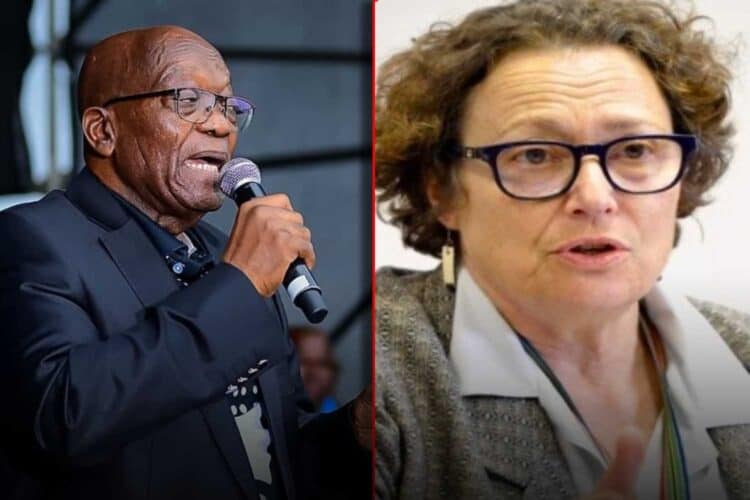The MK Party has publicly demanded the resignation of Janet Love, Deputy Chief Electoral Officer of the Electoral Commission (IEC), accusing her of bias and threatening legal action if she does not step down within seven days.
MK Party calls for IEC Deputy CEO’s head
The MK Party has voiced strong objections to Janet Love’s involvement in the Electoral Commission, particularly in light of a recent court ruling favouring former President Jacob Zuma.
“After much considerable reflexion, MK party condemns Janet Love’s conduct and therefore calls for her resignation as Commissioner of the Electoral Commission of South Africa (IEC) with immediate effect for her blatant acts of bias,” the party exclaimed.
Party spokesperson Nhlamulo Ndhlela highlighted incidents where Love allegedly exhibited biased behaviour, jeopardising the impartiality required for the upcoming May elections.
“The basis for our legitimate call for her removal, is due to her obnoxious behaviour on the 24 January 2024, before an objection was lodged regarding the eligibility of President Zuma to participate in the parliamentary elections. Janet Love, in an unprecedented move, publicly declared nationally that President Zuma would not be eligible and couldn’t be included in the MK Party’s parliamentary candidate list,” the MK Party claimed.
According to Ndhlela, Love’s premature announcement concerning Zuma’s eligibility for the parliamentary elections, before any formal objection was lodged, violated IEC protocols and displayed a conflict of interest given her political connections and prior statements.
“What made things worse is that, even after the obviously orchestrated objection which was launched by a member of the ANC, she still presided within the committee responsible for deciding on President Zuma’s eligibility, instead of recusing herself. Despite the clear conflict of interest,” the party noted.
The party insists that her continued presence in the commission compromises the integrity of the electoral process.
“Unfortunately, Janet Love’s actions have significantly eroded our confidence in her ability to fulfil these critical requirements. In light of these concerns, and in the interest of preserving the sanctity of our electoral system, the MK Party formally calls for the immediate resignation of Commissioner Janet Love from the IEC,” the party called.
IEC wants ‘clarity’ on Zuma ruling from apex court
The fiery statement from the MK Party follows an announcement by the electoral body to submit an urgent review application at the Constitutional Court.
In a statement, the IEC explained the commission aims to gain clarity on the interpretation of section 47(1)(e) of the constitution, which pertains to the eligibility of candidates in elections.
This appeal, according to the IEC, is crucial not only for the present case but also for establishing a clear precedent for future electoral processes.
The IEC asserts that this step is necessary to uphold the principles of free and fair elections and is not an attempt to influence political outcomes.
On Tuesday, the Electoral Court ruled that former president Jacob Zuma is eligible to run for office in the 2024 elections.
This ruling came after the court overturned a decision by the IEC, which had previously disqualified Zuma based on his past criminal conviction.
The controversy began when the IEC disqualified Zuma from running for a parliamentary seat, citing a 15-month prison sentence he had served for contempt of court.
This decision was challenged by Zuma’s legal team in the Electoral Court, led by Advocate Dali Mpofu.
In their decision, the judges stated,
“The appeal succeeds. The decision of the electoral commission of 28 March 2024 in terms of which the electoral commission upheld Dr Matsapola’s objection to the second applicant’s candidacy [Mr Zuma] is set aside and substituted with the following: The objection is hereby dismissed.”
This ruling effectively cleared the way for Zuma to represent the MK Party as a candidate in the upcoming election cycle.
With this court decision, Zuma regained the opportunity to actively participate in South Africa’s political landscape, an opportunity that was previously hindered by the IEC’s interpretation of his eligibility.






